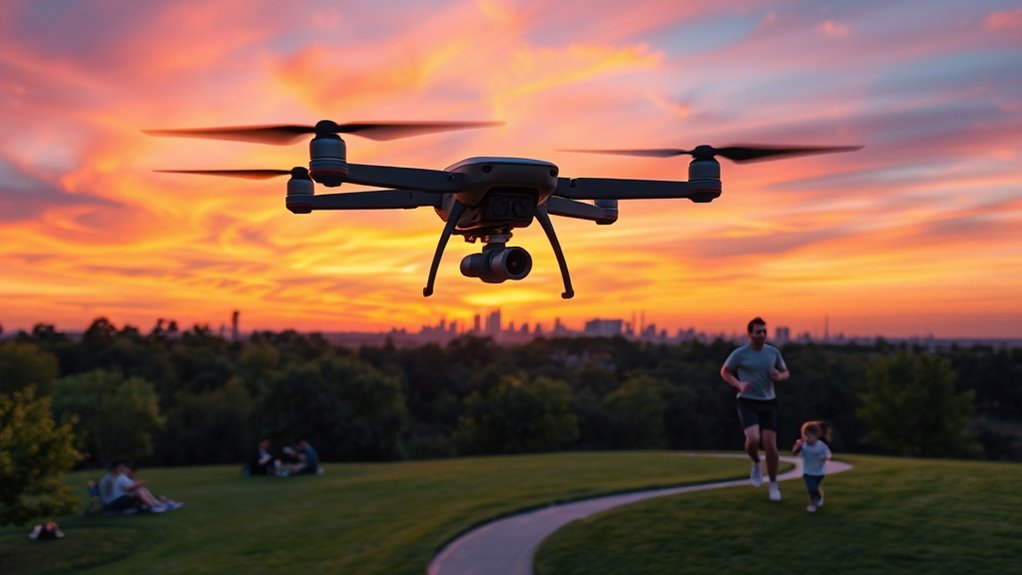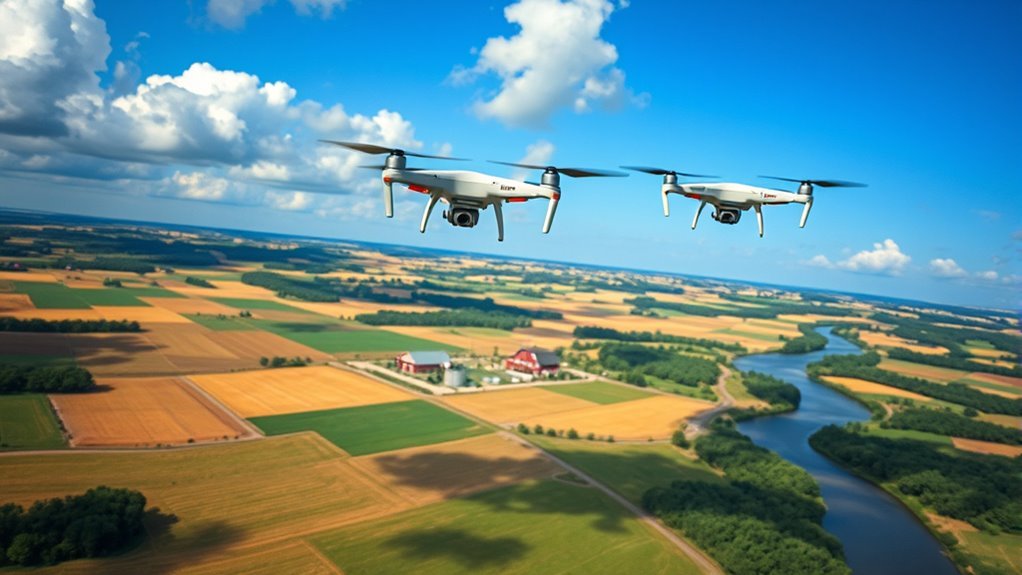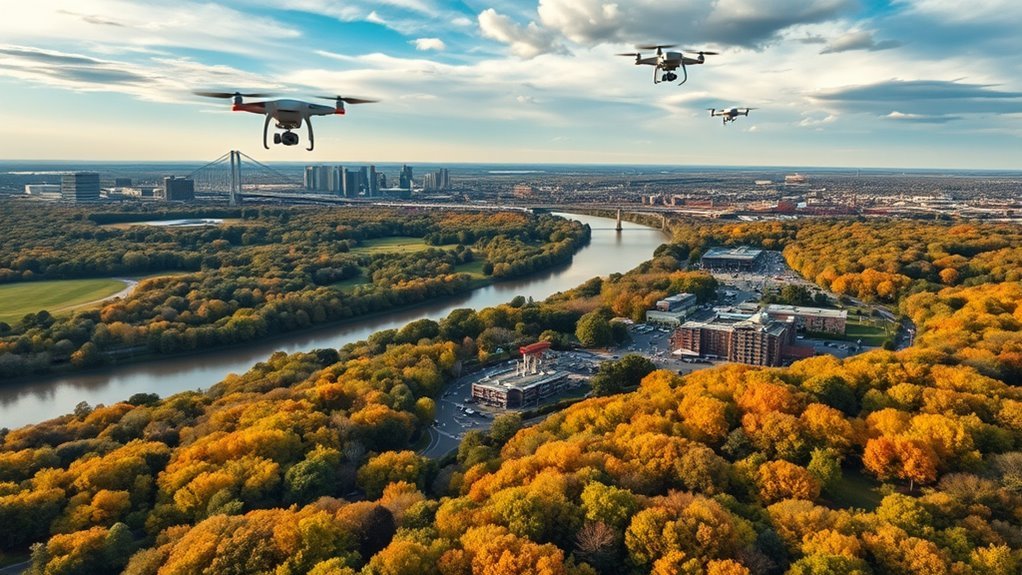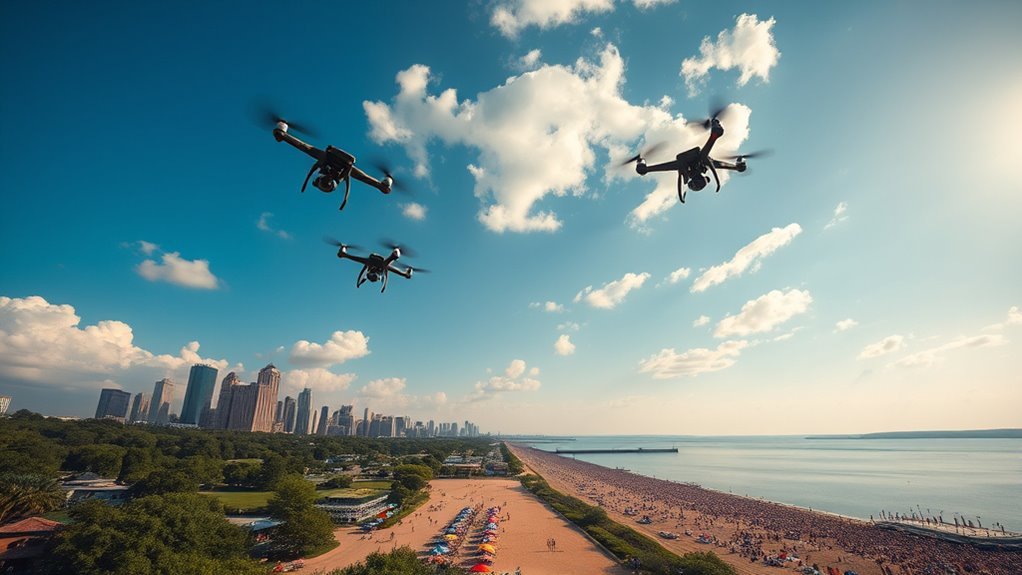Drones are still flying in New Jersey for several compelling reasons. They enhance public safety by quickly evaluating emergencies and aiding search and rescue efforts. In agriculture, they monitor crops efficiently, allowing for precise interventions. Real estate benefits from stunning aerial photography that captures properties engagingly. Infrastructure inspections are expedited, revealing maintenance needs while minimizing risks. Finally, drones play an essential role in environmental conservation by monitoring wildlife and ecosystems. You’ll discover more about these fascinating applications soon.
Enhancing Public Safety and Emergency Response

As public safety becomes an ever-growing concern, drones have emerged as an essential tool in enhancing emergency response efforts. They play a significant role in disaster response, allowing first responders to assess situations quickly and efficiently. Imagine a search and rescue operation where drones can scout vast areas, providing real-time data that saves time and resources. With their ability to navigate difficult terrains and monitor hazardous environments, drones enhance situational awareness, keeping responders safe while maximizing their effectiveness. Brinc’s thermal imaging technology can be integrated with drones, allowing for swift detection of heat signatures and identifying hidden threats in low-visibility environments. Additionally, these aerial devices can deliver essential supplies to those stranded in challenging conditions. By integrating drones into emergency protocols, you’re not just adopting technology; you’re embracing a smarter, more agile approach to safeguarding communities and ensuring freedom from fear during crises. Moreover, their ability to leverage real-time data analytics empowers teams to make informed decisions that can significantly improve response outcomes.
Transforming Agriculture and Farming Practices

While traditional farming methods have served us well for generations, the integration of drones into agriculture is revolutionizing how we cultivate and manage crops. Drones enable precision agriculture, allowing you to monitor crop health with unparalleled accuracy. With aerial imagery, you can identify issues like pest infestations or nutrient deficiencies before they escalate, optimizing your yield and reducing waste. These tools make crop monitoring more efficient, saving you time and resources. Imagine being able to survey your entire field in minutes rather than hours. Drones give you the freedom to make informed decisions based on real-time data, enhancing both productivity and sustainability. As agriculture evolves, embracing these technologies can empower you to thrive in a competitive market. Moreover, AI-driven spraying decisions allow for targeted applications that significantly minimize waste and enhance overall efficiency. Additionally, the use of high-resolution imaging enables early detection of crop stress, ensuring timely interventions to sustain healthy yields.
Revolutionizing Real Estate Marketing and Development

With the rapid advancement of technology, drones have emerged as game-changers in real estate marketing and development. You can leverage aerial photography to showcase properties from stunning perspectives, capturing features that traditional methods simply can’t. This enthralling imagery not only grabs attention but also enhances your listings, making them stand out in a crowded market. In addition, drones facilitate immersive virtual tours, allowing potential buyers to explore properties from the comfort of their homes. This innovative approach not only saves time but also boosts engagement, as clients can envision themselves in the space. By embracing drone technology, you’re not just keeping up with trends; you’re revolutionizing your marketing strategies, ultimately empowering your business to thrive in a competitive landscape. Furthermore, the integration of advanced AI and autonomous systems enhances drone efficiency, providing even more precise data analytics for your marketing efforts. Additionally, the use of precision crop and pest detection technologies can help real estate developers assess land conditions accurately, ensuring optimal land use and sustainable development practices.
Supporting Infrastructure Inspections and Maintenance
Drones have become invaluable tools for supporting infrastructure inspections and maintenance, offering a level of efficiency and accuracy that traditional methods often lack. With drone technology advancing rapidly, you can enhance infrastructure assessment processes considerably. Here are some key benefits:
- Faster data collection: Drones can cover large areas in a fraction of the time.
- Safer inspections: They reduce the need for personnel to access hazardous locations.
- High-resolution imagery: Drones capture detailed visuals, revealing issues that may go unnoticed, including crop health analysis that can be critical for timely interventions.
- Cost-effective solutions: Utilizing drones minimizes labor and equipment costs.
- Real-time analysis: Data can be processed immediately, allowing for quick decision-making.
- Enhanced safety: Drones utilize autonomous navigation systems that reduce risks during inspections.
Promoting Environmental Conservation and Monitoring
As infrastructure inspections benefit from drone technology, environmental conservation efforts are also seeing significant advancements. Drones are revolutionizing wildlife monitoring and habitat assessment, enabling you to gather essential data without disturbing ecosystems. By using high-resolution cameras and sensors, you can analyze changes in habitats and track wildlife populations effectively. Additionally, the integration of spectral data analysis allows for improved tracking of vegetation indices, supporting biodiversity efforts. Furthermore, advanced drone technology ensures that data collection is both precise and efficient, enhancing the overall effectiveness of conservation initiatives.
| Application | Benefits | Impact |
|---|---|---|
| Wildlife Monitoring | Non-intrusive observation | Better population management |
| Habitat Assessment | Detailed landscape analysis | Informed conservation strategies |
| Data Collection | Rapid and efficient | Real-time decision-making |
| Ecosystem Monitoring | Wide area coverage | Enhanced biodiversity protection |
With drones, you’re empowered to make informed choices and promote environmental conservation like never before.
Frequently Asked Questions
What Are the Legal Regulations for Flying Drones in New Jersey?
In New Jersey, you need to follow FAA regulations, including drone insurance and specific flying heights. Always check local laws and guarantee you’re not infringing on privacy rights while enjoying the freedom drones provide.
How Can I Obtain a Drone Pilot License in New Jersey?
To obtain a drone pilot license in New Jersey, you’ll need to complete drone training programs and meet pilot certification requirements. This guarantees you’re knowledgeable and prepared to fly safely and responsibly in various environments.
Are There Restrictions on Flying Drones Near Airports?
Flying your drone near airports isn’t just a minor concern; it’s a serious matter. Airport proximity creates drone no-fly zones, ensuring safety. Always check local regulations to maintain your freedom while respecting airspace rules.
What Are Common Drone Safety Practices for Recreational Users?
For safe drone operation, follow etiquette by respecting others’ privacy and maintaining a safe flight altitude. Always check local regulations, avoid crowded areas, and keep your drone within visual line of sight to guarantee a responsible experience.
How Do Drones Affect Wildlife and Local Ecosystems?
Drones can be fascinating yet disruptive; while they offer unique perspectives, they also cause wildlife disturbances and ecosystem impacts. You’ll want to reflect on how their presence affects local habitats and animal behaviors before flying.

